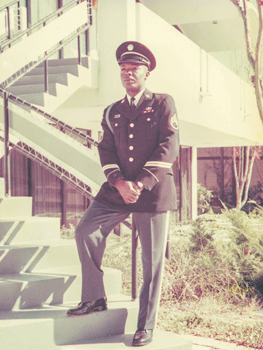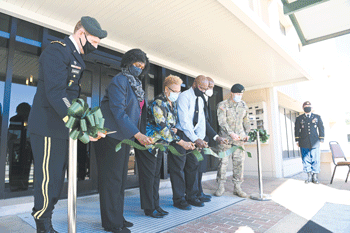 On March 24, 1969, a young Special Forces soldier from Georgia, found himself thousands of miles away from home and family. Instead of coaching Little League or playing catch, he was leading a group of Vietnamese soldiers who were serving in the Civilian Irregular Defense Group. The CIDG was part of the Mobile Strike Force Command — otherwise known as Mike teams, which were trained and led by American Special Forces.
On March 24, 1969, a young Special Forces soldier from Georgia, found himself thousands of miles away from home and family. Instead of coaching Little League or playing catch, he was leading a group of Vietnamese soldiers who were serving in the Civilian Irregular Defense Group. The CIDG was part of the Mobile Strike Force Command — otherwise known as Mike teams, which were trained and led by American Special Forces.
The soldier, Staff Sergeant William Maud Bryant, came of age during segregation, a time of economic and social inequality. Unlike many people at that time, Bryant volunteered to join the Army at the age of 20. His first assignment was with the 82nd Airborne Division. Later, he volunteered to go through Ranger School, graduating as the Honor Graduate. When he returned to Fort Bragg, he decided to tackle another challenge: Special Forces. He wrote in his journal that he would “see the guys on Fort Bragg who wore the Green Beret,” and "wanted to do what they did.” It was at Fort Bragg, as a Special Forces soldier, Bryant found his calling. He wrote that he had “found what he was looking for in the Army … a chance to lead from the front.” He further explained that “amongst the Green Berets, race, color or creed did not matter.”
With a career he enjoyed and a family he loved, Bryant continued to excel in his military life and his home life. He had a wife, a daughter and two sons. For love of country, he left his family back at Fort Bragg and headed to Vietnam. Sergeant Bryant was assigned to the 5th Special Forces Group (Airborne). At that time, the 5th SFG (A) was leading the fight in Vietnam. Once in country, Staff Sgt. Bryant trained, advised and assisted a paramilitary counterinsurgency force that included those indigenous to the area — known as Light Force 321.
On March 24, while leading a patrol of the group in the Long Khanh Province, Bryant’s base camp came under fire. During a 34-hour attack, Bryant moved through enemy fire while establishing a defense perimeter, directing fire, distributing ammunition, assisting the wounded and leading a patrol.
During the patrol, Bryant was wounded but called for helicopter support and directed suppressive fire toward enemy positions. Without fear, Staff Sgt. Bryant charged at an enemy automatic weapons position, destroying three of its defenders, before becoming mortally wounded by an enemy rocket. When a helicopter drop of ammunition was made to re-supply the beleaguered force Bryant, with complete disregard for his safety, ran through the heavy enemy fire to retrieve the scattered ammunition boxes and distributed needed ammunition to his men.
During a lull in the intense fighting, he led a patrol outside the perimeter to obtain information of the enemy. The patrol came under intense automatic weapons fire and was pinned down. Staff Sgt. Bryant single-handedly repulsed one enemy attack on his small force and by his heroic action inspired his men to fight off other assaults.
Seeing a wounded enemy soldier some distance from the patrol location, he crawled forward alone under heavy fire to retrieve the soldier for intelligence purposes. Finding that the enemy soldier had expired, Bryant crawled back to his patrol and led his men back to the company position where he again took command of the defense.
As the siege continued, Staff Sgt. Bryant organized and led a patrol in a daring attempt to break through the enemy encirclement. The patrol had advanced some 200 meters by heavy fighting when it was pinned down by the intense automatic weapons fire from heavily fortified bunkers, and he was severely wounded. Despite his wounds he rallied his men, called for a helicopter gunship support, and directed heavy suppressive fire upon the enemy positions.
Following the last gunship attack, Bryant fearlessly charged an enemy automatic weapons position, overrunning it, and single-handedly destroying its three defenders. Inspired by his heroic example, his men renewed their attack on the entrenched enemy.
While regrouping his small force for the final assault against the enemy, Staff Sgt. Bryant died.
For his actions on that day, Bryant was posthumously promoted to Sergeant First Class and was awarded the highest honor a soldier can earn — the Medal of Honor.
The citation reads: “For conspicuous gallantry and intrepidity in action at the risk of his life above and beyond the call of duty. His selfless concern for his comrades, at the cost of his life above and beyond the call of duty are in keeping with the highest traditions of the military service and reflect great credit upon himself, his unit, and the U.S. Army.”
In September 1974, Bryant Hall, the headquarters building of the U.S. Army John F. Kennedy Special Warfare Center and School on Fort Bragg, was dedicated in Bryant’s memory. On Feb. 16 of this year, the SWCS Command commemorated the anniversary of the award presentation honoring Bryant’s sacrifice with a ceremony and the opening of the Bryant Gallery in the headquarters lobby. Bryant’s sons, Greg and Kelvin, and their wives were on hand to take part in the ceremony.
Prior to the ceremony members of the SWCS staff visited the Bryants and listened to their recollections and looked through what they had of their fathers, scrapbooks with photos, awards that proclaimed his bravery and love of country and love of his fellow soldiers. They also had the opportunity to see Bryant’s Medal that was hanging on a wall in Greg’s house.
Greg noted that his friends would come by and they would see it and think it was cool, but when he saw the reaction from the soldiers who visited his home, he realized where the Medal needed to be, and the family donated the Medal of Honor to SWCS as the centerpiece of the Bryant Gallery.
During the commemoration ceremony, Maj. Gen. Patrick Roberson, the Commander of the U.S. Army John F. Kennedy Special Warfare Center and School, noted, “Today, on the 50th anniversary of President Nixon’s presentation of the Medal of Honor to Sgt. 1st Class Bryant’s family, we once again gather to commemorate his legacy. Today, he would have been 88.”
“On 24 March, Sgt. 1st Class Bryant gave the last full measure of devotion to his teammates, his partners, and to the nation. Sgt. 1st Class Bryant so firmly believed in the values of freedom and prosperity, that he was willing to give his life to this cause. He fought bravely, leading from the front, until his last breath in the triple canopy jungle of Vietnam, on a lone fire base … with his comrades. The lessons learned from Sgt. 1st Class Bryant’s experiences — operating in austere and remote conditions and fighting by, with, and through indigenous partner forces — are timeless.”
While the Bryant brothers can barely remember the ceremony at the White House where President Richard Nixon posthumously awarded the Medal of Honor to their mother, seeing it in the headquarters building that still carries his name was emotional for them, but it let them see and understand the kind of man their father was, and that while he is gone, he has not been forgotten.
Pictured above: Sgt. 1st Class William M. Bryant was killed in action in Vietnam on March 24, 1969. He was posthumously awarded the Medal of Honor for his actions.
Pictured botton left: Together, Maj. Gen. Patrick Roberson (left), Greg and Kelvin Bryant and their wives, cut the ribbon to the entrance of the new Bryant Gallery. The ceremony held Feb. 16 was the anniversary of the award presentation and Sgt. 1st Class Bryant's birthday.
Pictured bottom right: "For conspicuous gallantry and intrepidity in action at the risk of his life above and beyond the call of duty." Sgt. 1st Class Bryant's family donated his Medal of Honor to SWCS to serve as the centerpiece in the new Bryant Gallery. (All photos courtesy U.S. Army John F. Kennedy Special Warfare Center and School)

